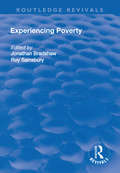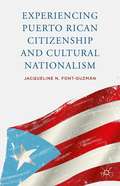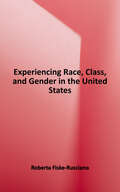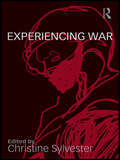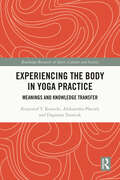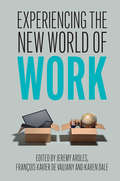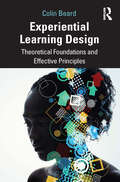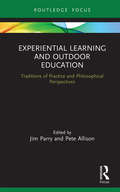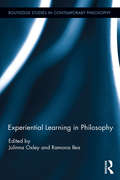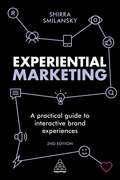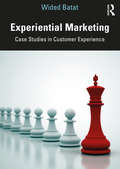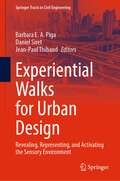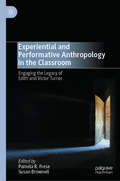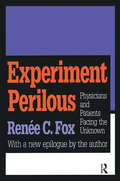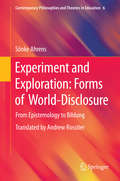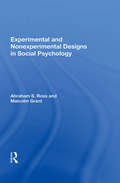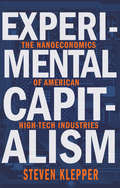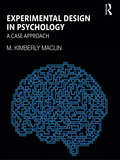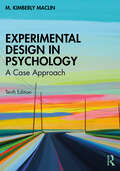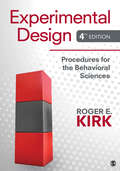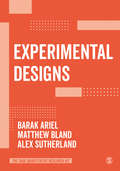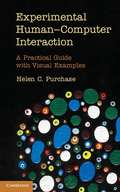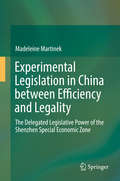- Table View
- List View
Experiencing Poverty
by Jonathan Bradshaw Roy SainsburyThis title was first published in 2000: Marking the centenary of Seebohm Rowntree’s first study of poverty in York, this volume examines the modern impact of poverty on health, nutrition, crime, gender and ethnicity.
Experiencing Puerto Rican Citizenship and Cultural Nationalism
by Jacqueline N. Font-GuzmánDrawing from in-depth interviews with a group of Puerto Ricans who requested a certificate of Puerto Rican citizenship, legal and historical documents, and official reports not publicly accessible, Jacqueline Font-Guzmán shares how some Puerto Ricans construct and experience their citizenship and national identity at the margins of the US nation. Winner of the 2015 Juridical Book of the Year in the category of ‘Essay Promoting Critical Thinking and Analysis of Juridical and Social Issues.’
Experiencing Race, Class, and Gender in the United States, Seventh Edition
by Roberta Fiske-RuscianoThrough individual stories, essays, poetry, and critical analyses, Experiencing Race, Class, and Gender in the United States, Seventh Edition, introduces issues of race, class, and gender within an interdisciplinary framework. Divided into three sections, Identity, Power, and Change, as well as nine parts, Fiske-Rusciano challenges readers to reflect on their own lives, examine the structural systems that contribute to inequality, and identify problems while visualizing change. “Understanding the Reading” questions encourage critical thinking and classroom discussion, and “Suggestions for Responding” encourage further study. In addition to its focus on minorities victimized by discrimination, this anthology also includes the experiences of the privileged and of those who resist change and reinforces students’ understanding that they can create change in their lives and in society. New to This Edition: - Twenty-five new readings focus upon divisions in our understanding of U.S. history and the consequences of those divisions - New Part VII “Race, Class, and Gender During the Obama and Trump Administrations: A Comparative Look,” focuses on themes such as racial politics, women’s rights, environmental justice, and marginalization.
Experiencing War (War, Politics and Experience)
by Christine SylvesterThis edited collection explores aspects of contemporary war that affect average people –physically, emotionally, and ethically through activities ranging from combat to television viewing. The aim of this work is to supplement the usual emphasis on strategic and national issues of war in the interest of theorizing aspects of war from the point of view of individual experience, be the individual a combatant, a casualty, a supporter, opponent, recorder, veteran, distant viewer, an international lawyer, an ethicist or other intellectual. This volume presents essays that push the boundaries of war studies and war thinking, without promoting one kind of theory or methodology for studying war as experiential politics, but with an eye to exploring the possibilities and encouraging others to take up the new agenda. It includes new and challenging thinking on humanitarianism and war, new wars in the Third World, gender and war thinking, and the sense of the body within war that inspires recent UN resolutions. It also gives examples that can change our understanding of who is located where doing what with respect to war –women warriors in Sierra Leone, war survivors living with their memories, and even an artist drawing something seemingly intangible about war –the arms trade. The unique aspect of this book is its purposive pulling together of foci and theoretical and methodological perspectives from a number of disciplines on a variety of contemporary wars. Arguably, war is an activity that engages the attention, the politics, and the lives of many people. To theorize it with those lives and perspectives in mind, recognizing the political contexts of war, is long overdue. This inter-disciplinary book will be of much interest to students of war studies, critical security studies, gender studies, sociology and IR in general.
Experiencing the Body in Yoga Practice: Meanings and Knowledge Transfer (Routledge Research in Sport, Culture and Society)
by Krzysztof T. Konecki Aleksandra Płaczek Dagmara TarasiukExperiencing the Body in Yoga Practice inspires more mindful and contemplative qualitative research on body and knowledge transfer in bodily practices in hatha yoga. The book explores the work of the mind, as well as the role of emotions and body sensations in perceiving reality and in reflecting on it. Procedures and research methods are an extension of our mind, which wants to reach into the social reality to describe it objectively. It usually refuses body and emotions. The techniques of sampling and representativeness are also tools of the mind. Using these tools, our contact with social reality produces emotions and feelings of the body. These phenomena surrounding the mind and body often go unnoticed during research and are only partially reported in the conclusions. Experiencing the Body in Yoga Practice examines this gap. It presents the application of a contemplative way of thinking and proceeding in qualitative social research and a first-person perspective, focusing on experiencing lived body and knowledge transfer in hatha yoga. It analyzes how the mind focuses and stops working, proceeds in the limited province of the meaning of yoga, how the body produces emotions and deals with them during yoga sessions, and how the knowledge is transferred by using the body in some linguistic and cultural context. The book will be of interest to sociologists and social scientists who want to concentrate on and analyze the experiences of the body from contemplative and phenomenological perspective. It is also key reading for all practitioners dealing with body and bodywork, such as in sports, recreational activities, physical education, rehabilitation, physical work, educational activities, etc.
Experiencing the New World of Work
by Karen Dale Jeremy Aroles de Vaujany, François-XavierExploring the different facets of the new world of work (including the hacker and maker movements, platform work, and digital nomadism), this edited volume sets out to investigate and theorise how these new work practices are experienced by various actors. It explores such changes at both the micro and macro levels and sets out to link them back to wider social, managerial and political issues. In doing so, it aims to reflect on the similarities and differences between new and 'old' work practices and problematize discourses surrounding the future of work. This volume is characterized by the diversity of methods mobilized, the plurality of concepts, lenses and theories deployed as well as the richness of the empirical accounts used by the authors. It will appeal to a broad readership of management and organizational scholars as well as sociologists interested in current changes to the world of work.
Experiential Learning Design: Theoretical Foundations and Effective Principles
by Colin BeardExperiential Learning Design comprehensively demonstrates the key theories and applications for the design of experiential approaches to learning and training. Learning is gradually moving away from management and delivery of content, and toward experiences that encourage learners to engage and take greater responsibility for their own progress. This book’s empirically sound, multi-disciplinary approach balances technical-rational and artistic-intuitive design elements to accommodate the complex, fluctuating capacities of human learning. In-depth chapters cover design principles, social and environmental factors in learning, the importance of senses and emotions, and links between body and brain. This bold, unique perspective shift will enrich the work of learning scientists, instructional designers, educational technologists, and beyond.
Experiential Learning and Outdoor Education: Traditions of practice and philosophical perspectives
by Jim Parry Pete AllisonThis book adds to the theoretical development of the emerging fields of experiential learning and outdoor education by examining the central concept, 'experience', and interrogating a central claim of experiential learning: whether, and if so how, a short-term singular experience can transform a participant’s life as a whole and in a permanent way. While such a possibility has been corroborated by the personal testimonies of participants, and the activities of instructors over many years, the book argues that we must go beyond this kind of ‘evidence’. In comparing Anglophone and continental approaches and drawing on the work of Dewey, Dilthey and Merleau-Ponty in the philosophy of experience, Experiential Learning and Outdoor Education presents the first detailed review of the concept of ‘experience’ in European philosophy, as applied to outdoor experiential learning. A vital insight into the field, this is important reading for students and researchers working in the philosophy of sport, and pedagogical theory, especially in areas relating to the outdoors, but also to experiential education more generally.
Experiential Learning in Philosophy: Philosophy Without Walls (Routledge Studies in Contemporary Philosophy)
by Julinna Oxley Ramona IleaIn this volume, Julinna Oxley and Ramona Ilea bring together essays that examine and defend the use of experiential learning activities to teach philosophical terms, concepts, arguments, and practices. Experiential learning emphasizes the importance of student engagement outside the traditional classroom structure. Service learning, studying abroad, engaging in large-scale collaborative projects such as creating blogs, websites and videos, and practically applying knowledge in a reflective, creative and rigorous way are all forms of experiential learning. Taken together, the contributions to Experiential Learning in Philosophy argue that teaching philosophy is about doing philosophy with others. The book is divided into two sections: essays that engage in the philosophical debate about defining and implementing experiential learning, and essays that describe how to integrate experiential learning into the teaching of philosophy. Experiential Learning in Philosophy provides a timely reflection on best practices for teaching philosophical ideals and theories, an examination of the evolution of the discipline of philosophy and its adoption (or reclamation) of active modes of learning, and an anticipation of the ways in which pedagogical practices will continue to evolve in the 21st century.
Experiential Marketing: A Practical Guide to Interactive Brand Experiences
by Shirra SmilanskyThe immersive brand experience is revolutionizing brand engagement. Experiential Marketing, second edition, cuts through the jargon with clear practical guidelines on how to magnify marketing strategies to a powerful new level. This book emphasizes that experiential marketing is not just about creating a live event. A unique, immersive experience allows businesses to generate a surge of brand engagement, which is amplified immediately by a niche target of consumers through live content sharing and social media streams. This comprehensive second edition of Experiential Marketing pinpoints exactly where this innovative strategy fits in with the current marketing and events climate, including a step-by-step outline to plan, integrate and evaluate its game-changing results. The completely fresh content analyzes the latest industry advances and case studies, including four new chapters on the digital experience and merged realities, plus the experience economy and creative explosion of the 'Pop-Up' phenomenon. Accompanied with a digital toolkit of downloadable resources, this book is essential reading for marketing, business, media and events professionals alike, providing strategic decision makers with a unique competitive advantage in a vibrant new era of marketing strategy.
Experiential Marketing: Case Studies in Customer Experience (Routledge Interpretive Marketing Research Ser.)
by Wided BatatExperiential marketing has become an indispensable tool for all types of businesses across multiple sectors. This book provides an all-encompassing, practical, and conceptual map of contemporary experiential case studies, which together offer insights into this exciting approach to customer experience. Experiential Marketing incorporates 36 international case studies from 12 key sectors, from technology, consumer goods, and B2B to luxury, events, and tourism sectors. With a selection of case studies from leading brands, such as Coca-Cola, Nutella, Chanel, NASA, The New York Times, Pfizer, and Amtrak, the reader will learn and practice the experiential marketing tools and strategies through these examples. Expert testimonials, practical applied exercises, and the author’s online videos provide both theoretical foundations and concrete application. This is a must-read for advanced undergraduate and postgraduate Marketing and Customer Experience students and an excellent teaching resource. It should also be of great use to practitioners – particularly those studying for professional qualifications – who are interested in learning experiential marketing strategies and developing knowledge about the way big brands in different sectors are designing the customer experience online and offline. Online material includes lecture slides, a test bank of questions, an instructor’s manual, and explanatory videos.
Experiential Walks for Urban Design: Revealing, Representing, and Activating the Sensory Environment (Springer Tracts in Civil Engineering)
by Jean-Paul Thibaud Barbara E. A. Piga Daniel SiretThe edited volume explores the topic of experiential walks, which is the practice of multi- or mono-sensory and in-motion immersion into an urban or natural environment. The act of walking is hence intended as a process of (re-)discovering, reflecting and learning through an embodied experience. Specific attention is devoted to the investigation of the ambiance of places and its dynamic atmospheric perception that contribute to generating the social experience. This topic is gaining increasing attention and has been studied in several forms in different disciplines to investigate the particular spatial, social, sensory and atmospheric character of places. The book contains chapters by experts in the field and covers both the theory and the practice of innovative methods, techniques, and technologies. It examines experiential walks in the perspective of an interdisciplinary approach to environmental and sensory urban design by organising the contributions according to three specific interrelated focuses, namely the exploration and investigation of the multisensory dimension of public spaces, the different ways to grasp and communicate the in-motion experience through traditional and novel forms of representation, and the application of the approach to urban participatory planning and higher education. Shedding new light on the topic, the book offers both a reference guide for those engaged in applied research, and a toolkit for professionals and students.
Experiential and Performative Anthropology in the Classroom: Engaging the Legacy of Edith and Victor Turner
by Susan Brownell Pamela R. FreseThe contributors gathered here revitalize “ethnographic performance”—the performed recreation of ethnographic subject matter pioneered by Victor and Edith Turner and Richard Schechner—as a progressive pedagogy for the 21st century. They draw on their experiences in utilizing performances in a classroom setting to facilitate learning about the diversity of culture and ways of being in the world. The editors, themselves both students of Turner at the University of Virginia, and Richard Schechner share recollections of the Turners’ vision and set forth a humanistic pedagogical agenda for the future. A detailed appendix provides an implementation plan for ethnographic performances in the classroom.
Experiment Perilous: Physicians and Patients Facing the Unknown
by Renee C. Fox"This is a brilliant work of lasting value to both sociology and anthropology by a person combining the talent of keen observer with the highest level of theoretical sophistication. . . a major contribution to our understanding of the nature and structure of a significant social situation."--David M. Schneider, The University of Chicago. Experiment Perilous covers a three-year period In the lives of the patients and physicians in a small and intense hospital community. It represents a pioneering, participant-observation-based study of a hospital ward as a social system. In a new epilogue. Fox provides a historical and sociological account of phenomena relevant to clinical investigations that she has observed in her forty-five years as a sociologist of medicine.
Experiment and Exploration: Forms of World-Disclosure
by Sönke AhrensThis book deals with contemporary epistemological questions, connecting Educational Philosophy with the field of Science- and Technology Studies. It can be understood as a draft of a general theory of world-disclosure, which is in its core a distinction between two forms of world-disclosure: experiment and exploration. These two forms have never been clearly distinguished before. The focus lies on the experimental form of world-disclosure, which is described in detail and in contrast to the explorational form along the line of twenty-one characteristics, which are mainly derived from empirical studies of experimental work in the field of natural sciences. It can also be understood as an attempt to integrate elements of the Anglo-Saxon Philosophy of Science with elements of the German tradition of Educational Philosophy. This is also reflected in the style of writing. In accordance to the content-level of the book, the argument for experimental forms of world-disclosure is written in an essayistic, readable style, which can be understood as an experimental form of writing. This book is a translation of the doctoral thesis 'Experiment und Exploration. Bildung als experimentelle Form der Welterschließung' (summa cum laude). The thesis was published in German in 2010 by Transcript (Bielefeld) in the series called 'Theorie Bilden', edited by Prof. Dr. Hannelore Faulstich-Wieland, Prof. Dr. Hans-Christoph Koller, Prof. Dr. Karl-Josef Pazzini and Prof. Dr. Michael Wimmer.
Experimental And Nonexperimental Designs In Social Psychology
by Abraham S. RossThis book considers experimental designs, alternatives to experimental designs, survey methods, and how systematic collection of information can minimize alternative explanations in social psychology. It discusses meta-analysis for interpreting the results of many social psychology experiments.
Experimental Capitalism
by John H. Miller Steven Klepper Serguey Braguinsky David A. HounshellFor much of the twentieth century, American corporations led the world in terms of technological progress. Why did certain industries have such great success? Experimental Capitalism examines six key industries--automobiles, pneumatic tires, television receivers, semiconductors, lasers, and penicillin--and tracks the highs and lows of American high-tech capitalism and the resulting innovation landscape. Employing "nanoeconomics"--a deep dive into the formation and functioning of companies--Steven Klepper determines how specific companies emerged to become the undisputed leaders that altered the course of their industry's evolution.Klepper delves into why a small number of firms came to dominate their industries for many years after an initial period of tumult, including General Motors, Firestone, and Intel. Even though capitalism is built on the idea of competition among many, he shows how the innovation process naturally led to such dominance. Klepper explores how this domination influenced the search for further innovations. He also considers why industries cluster in specific geographical areas, such as semiconductors in northern California, cars in Detroit, and tires in Akron. He finds that early leading firms serve as involuntary training grounds for the next generation of entrepreneurs who spin off new firms into the surrounding region. Klepper concludes his study with a discussion of the impact of government and the potential for policy to enhance a nation's high-tech industrial base.A culmination of a lifetime of research and thought, Experimental Capitalism takes a dynamic look at how new ideas and innovations led to America's economic primacy.
Experimental Design in Psychology: A Case Approach
by M. Kimberly MacLinThis text is about doing science and the active process of reading, learning, thinking, generating ideas, designing experiments, and the logistics surrounding each step of the research process. In easy-to-read, conversational language, Kim MacLin teaches students experimental design principles and techniques using a tutorial approach in which students read, critique, and analyze over 75 actual experiments from every major area of psychology. She provides them with real-world information about how science in psychology is conducted and how they can participate. Recognizing that students come to an experimental design course with their own interests and perspectives, MacLin covers many subdisciplines of psychology throughout the text, including IO psychology, child psychology, social psychology, behavioral psychology, cognitive psychology, clinical psychology, health psychology, educational/school psychology, legal psychology, and personality psychology, among others. Part I of the text is content oriented and provides an overview of the principles of experimental design. Part II contains annotated research articles for students to read and analyze. Classic articles have been retained and 11 new ones have been added, featuring contemporary case studies, information on the Open Science movement, expanded coverage on ethics in research, and a greater focus on becoming a better writer, clarity and precision in writing, and reducing bias in language. This edition is up to date with the latest APA Publication Manual (7th edition) and includes an overview of the updated bias-free language guidelines, the use of singular "they," the new ethical compliance checklist, and other key changes in APA style. This text is essential reading for students and researchers interested in and studying experimental design in psychology.
Experimental Design in Psychology: A Case Approach
by M. Kimberly MacLinThis text is about doing science and the active process of reading, learning, thinking, generating ideas, designing experiments, and the logistics surrounding each step of the research process. In easy-to-read, conversational language, Kim MacLin teaches students experimental design principles and techniques using a tutorial approach in which students read, critique, and analyze over 75 actual experiments from every major area of psychology. She provides them with real-world information about how science in psychology is conducted and how they can participate. Recognizing that students come to an experimental design course with their own interests and perspectives, MacLin covers many subdisciplines of psychology throughout the text, including IO psychology, child psychology, social psychology, behavioral psychology, cognitive psychology, clinical psychology, health psychology, educational/school psychology, legal psychology, and personality psychology, among others. Part I of the text is content oriented and provides an overview of the principles of experimental design. Part II contains annotated research articles for students to read and analyze. New sections on how to critically evaluate media reports of scientific findings (in other words, how to identify ‘fake news’), authorship guidelines and decisions, survey research methods and AI tools have been included. Further, expanded information on the Open Science movement, and on ethics in research, and methods to achieve clarity and precision in thinking and writing are included. This edition is up to date with the latest APA Publication Manual (7th edition) and includes an overview of the bias-free language guidelines, the use of singular "they," and an ethical compliance checklist.. This text is essential reading for students and researchers interested in and studying experimental design in psychology.
Experimental Design in Psychology: A Case Approach
by M. Kimberly MacLinThis text is about doing science and the active process of reading, learning, thinking, generating ideas, designing experiments, and the logistics surrounding each step of the research process. In easy-to-read, conversational language, Kim MacLin teaches students experimental design principles and techniques using a tutorial approach in which students read, critique, and analyze over 75 actual experiments from every major area of psychology. She provides them with real-world information about how science in psychology is conducted and how they can participate.Recognizing that students come to an experimental design course with their own interests and perspectives, MacLin covers many subdisciplines of psychology throughout the text, including IO psychology, child psychology, social psychology, behavioral psychology, cognitive psychology, clinical psychology, health psychology, educational/school psychology, legal psychology, and personality psychology, among others. Part I of the text is content oriented and provides an overview of the principles of experimental design. Part II contains annotated research articles for students to read and analyze.New sections on how to critically evaluate media reports of scientific findings (in other words, how to identify ‘fake news’), authorship guidelines and decisions, survey research methods and AI tools have been included. Further, expanded information on the Open Science movement, and on ethics in research, and methods to achieve clarity and precision in thinking and writing are included.This edition is up to date with the latest APA Publication Manual (7th edition) and includes an overview of the bias-free language guidelines, the use of singular "they," and an ethical compliance checklist.. This text is essential reading for students and researchers interested in and studying experimental design in psychology.
Experimental Design: Procedures for the Behavioral Sciences (4th Edition)
by Roger E. KirkExperimental Design: Procedures for Behavioral Sciences, Fourth Edition is a classic text with a reputuation for accessibility and readability. It has been revised and updated to make learning design concepts even easier. Roger E. Kirk shows how three simple experimental designs can be combined to form a variety of complex designs. He provides diagrams illustrating how subjects are assigned to treatments and treatment combinations. New terms are emphasized in boldface type, there are summaries of the advantages and disadvantages of each design, and real-life examples show how the designs are used.
Experimental Designs (The SAGE Quantitative Research Kit)
by Alex Sutherland Barak Ariel Matthew P. BlandThe fourth book in The SAGE Quantitative Research Kit, this resource covers the basics of designing and conducting basic experiments, outlining the various types of experimental designs available to researchers, while providing step-by-step guidance on how to conduct your own experiment. As well as an in-depth discussion of Random Controlled Trials (RCTs), this text highlights effective alternatives to this method and includes practical steps on how to successfully adopt them. Topics include: · The advantages of randomisation · How to avoid common design pitfalls that reduce the validity of experiments · How to maintain controlled settings and pilot tests · How to conduct quasi-experiments when RCTs are not an option Practical and succintly written, this book will give you the know-how and confidence needed to succeed on your quantitative research journey.
Experimental Designs (The SAGE Quantitative Research Kit)
by Alex Sutherland Barak Ariel Matthew P. BlandThe fourth book in The SAGE Quantitative Research Kit, this resource covers the basics of designing and conducting basic experiments, outlining the various types of experimental designs available to researchers, while providing step-by-step guidance on how to conduct your own experiment. As well as an in-depth discussion of Random Controlled Trials (RCTs), this text highlights effective alternatives to this method and includes practical steps on how to successfully adopt them. Topics include: · The advantages of randomisation · How to avoid common design pitfalls that reduce the validity of experiments · How to maintain controlled settings and pilot tests · How to conduct quasi-experiments when RCTs are not an option Practical and succintly written, this book will give you the know-how and confidence needed to succeed on your quantitative research journey.
Experimental Human-Computer Interaction
by Helen C. PurchaseExperiments that require the use of human participants are time consuming and costly: it is important to get the process right the first time. Planning and preparation are key to success. This practical book takes the human-computer interaction researcher through the complete experimental process, from identifying a research question to designing and conducting an experiment, and then to analysing and reporting the results. The advice offered in this book draws on the author's twenty years of experience running experiments. In describing general concepts of experimental design and analysis she refers to numerous worked examples that address the very real practicalities and problems of conducting an experiment, such as managing participants, getting ethical approval, pre-empting criticism, choosing a statistical method and dealing with unexpected events.
Experimental Legislation in China between Efficiency and Legality: The Delegated Legislative Power Of The Shenzhen Special Economic Zone
by Madeleine MartinekThis book analyzes the benefits of and legal concerns in connection with the delegated legislation of the Shenzhen Special Economic Zone as a prime example of experimental legislation in Chinese law. It offers solutions for improving the legal design of experimental regulations in Special Economic Zones by striking a balance between the pursuit of rapid socio-economic progress on the one hand, and the increasing need and will to govern by the rule of law on the other. The book offers a valuable guide for the academic community and legal practitioners, as well as students eager to gain insights into Chinese constitutional law and the conflict between legality and achieving reforms.
